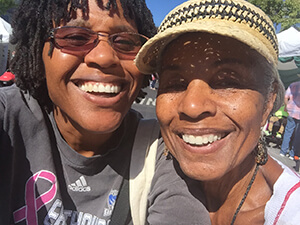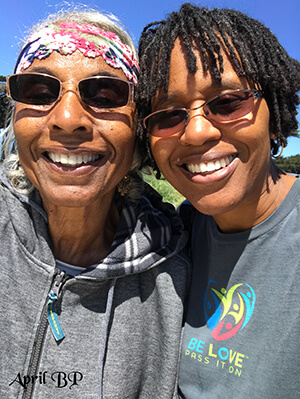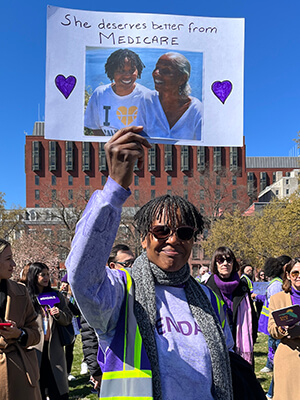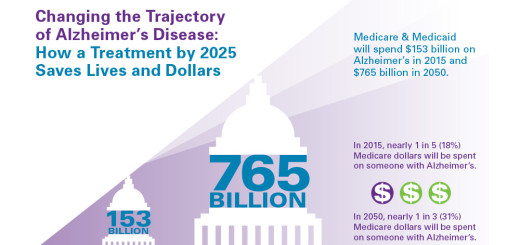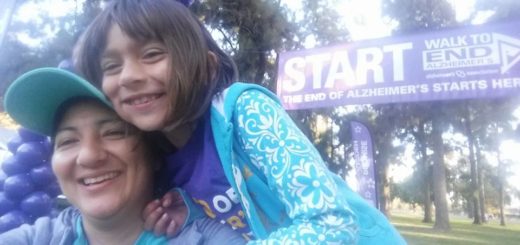Preventing discrimination against Black Alzheimer’s caregivers
When April Bolin’s mother, Margie, needed to be taken to the hospital at 2 a.m. because of hallucinations due in part to Alzheimer’s, she never thought she’d need to be dressed up to be taken seriously. However, April (a Black women) believes that the nurses looked at her in her disheveled state and decided she was trying to take advantage of her mother and blocked access to Margie. It was through this painful incident that April found the Alzheimer’s Association®. Today, April and her wife advocate for Alzheimer’s education so other people of color don’t have to experience what she did.
Seeing a doctor
Margie Bates was the oldest of 12 brothers and sisters with her youngest sibling born roughly around the same time as she started having her own children. Margie’s third child, April, is only seven years younger than Margie’s youngest sister. April knew her mother as strong willed and feisty. If she didn’t want to do something, she wasn’t going to do it.
April started noticing her mother was having problems with her memory. Having lived in the Bay Area for many years, Margie no longer recognized the carpool lanes on the freeway or the K-Mart she used to shop at regularly. “She moved away and came back,” said April. “Things were so unfamiliar to her after moving back. She would get lost driving.”
Eventually, Margie started having trouble with her balance which is what prompted her to see a doctor. After an MRI and a cognitive assessment, the neurologist diagnosed her with Alzheimer’s disease and promptly took away her license. April said, “An innocent visit turned into a grim diagnosis.”
Sadly, April was no stranger to Alzheimer’s and dementia. Both her grandmother and great grandmother had the disease. “I only [knew] my great grandmother with the disease,” said April. My brothers are older and they remembered her before [the disease]. I very much remember my grandmother in the late stages before she died.”
Withholding the diagnosis
Knowing her mother’s personality, April was hesitant to tell her that she had Alzheimer’s. While she wouldn’t recommend this to most caregivers, April asked the doctor not to tell her mother. She wanted to ease Margie into the diagnosis, and luckily the doctor reluctantly agreed.
“We have to gently approach her personality,” said April. “She needs to control everything, otherwise she’ll push everyone out. When the doctor took away her license, she had an adult temper tantrum. [At a follow up appointment] she refused to see that neurologist. She said, ‘If you make me go to the appointment I’m going to sit in the car and I’m not going anywhere.’”
As with many families, the dynamic made it difficult for April to inform her aunts and uncles that Margie had Alzheimer’s and that April needed help caring for her. “There is a phenomenon that happens in some families that happened in mine,” said April. “They can’t believe what they can’t see. They chose to believe Margie was healthy and well and the same person they knew 10 years prior. When I reached out and said I need help, they kind of turned their backs on me.”
A car accident
In 2017, Margie was walking alone, stepped into traffic, didn’t see or hear the oncoming car and was hit at 40 miles per hour. Margie survived but now had a brain injury on top of her dementia. With a few weeks of rehabilitation Margie was sent home but started having hallucinations. One night it got so bad that April decided it was time to call 911 for help.
“It was 2 a.m. and I needed help,” said April. “I said, ‘This is my mother, she has Alzheimer’s and a brain injury, do you have any sensitive female officers that can help respond to this crisis.’ They said, ‘We don’t have any female police officers, but we have someone that is great.’ They transferred her to the hospital and they were so kind.”
Discrimination
According to the Alzheimer’s Association’s Alzheimer’s Disease Facts and Figures special report on Race, Ethnicity and Alzheimer’s in America, half of Black Americans say that they have experienced discrimination while seeking care for a person living with Alzheimer’s. Among non-White caregivers, half or more say they have faced discrimination when navigating health care settings for their care recipient, with the top concern being that providers or staff do not listen to what they are saying because of their race, color or ethnicity.
Margie was taken to the same hospital she had been treated at for her head injury. April arrived ahead of the ambulance at the hospital with her mother’s durable power of attorney, living will and notes from the doctors at that hospital from Margie’s recent stay. The nurse took one look at a slightly disheveled and utterly exhausted April and decided that she was lying. She believed that April had tricked her mother into signing those legal documents and was trying to steal all of her mother’s money.
“The ER nurse said, ‘I see all of that paperwork, but we decided she can make her own decisions and she doesn’t want to see you,’” said April. “That nurse proceeded to call family members who didn’t think mom had a problem and asked them, ‘Do you know anything about April financially abusing her mom and coercing the living trust.’”
While the hospital admitted Margie, they began searching for other family members to come and care for her. Eventually they realized Margie did in fact need help to make medical decisions, but at that point the damage had already been done.
I paid to have her belongings moved to a memory care facility. I signed all the paperwork at the facility in preparation for her to be admitted there the next day. Something told me, after writing the check, to check the balance on her account. That’s when I learned I no longer had access.
“I paid to have her belongings moved to a memory care facility,” said April. “I signed all the paperwork in preparation for her to be admitted [to memory care] the next day. After writing the check something told me to check the balance on her account. That’s when I learned that a family member had cut me off from her account permanently. They couldn’t have done that without having [my mom] on the phone.”
Lost job opportunity
April was never able to gain access to her mother’s account again. She contacted many state and national organizations and was able to work with the hospital to help recover some of the funds. However, this incident did more than just financial damage, it also cost April a job opportunity.
At the time of the incident, April was in the final hiring stages of a supervisor position for Adult Protective Services (APS). Because of the situation at the hospital, APS had to be called, which essentially disqualified her from the position. “They had to contact APS, there was no way around it,” said April. “It impacted my job. I didn’t get it.
“It was just awful. I don’t think people consciously know they’re doing harm because of the stereotype. The receptionist wouldn’t talk to me, no one would talk to me, they rolled their eyes. I shouldn’t have to be dressed as a professional to go to the hospital and care for my mom.”
Becoming an advocate
The one good thing that came out of April’s experience with her mother was reaching out to the Alzheimer’s Association for help. April said, “I called the Alzheimer’s Association [24/7 Helpline at 800.272.3900] and talked to [a family care specialist who was] wonderful.”
From there April knew she wanted to give back and decided to become an advocacy volunteer. She felt that as an advocate she could help prevent what happened to her from happening to other people, especially people of color.
“I went to Advocacy Day in Sacramento,” said April. “I didn’t know what to expect. I took my wife along and we’ve been active ever since. What made it easy is that they really look to hear people’s stories, and I can do that well.”
In 2023, April hopped on a plane and flew to Washington D.C. for the Alzheimer’s Association Advocacy Form. There they had the opportunity to speak with members of congress and participate in a rally asking the Centers for Medicare & Medicaid Services (CMS) to change their decision on restricting Medicare coverage of FDA-approved treatments that target amyloid for Alzheimer’s disease.
April also participated in the San Francisco rally outside of the CMS offices in May of 2023. She and several other volunteers told their stories sharing why early access to treatment would have been beneficial to them. It was through the hard work of volunteers like April that CMS ultimately decided to update their decision and enable access to FDA- approved treatments.
“It was powerful,” said April. “I really felt that I was making a difference and seeing change happen. The energy was so strong and it was amazing being a part of that. We can’t be complacent with this. If each individual realizes that they will be impacted in some capacity by Alzheimer’s or another dementia, then I think we owe it to ourselves and to society at large to be vocal. I think it’s incumbent upon us to be advocates.”
Wouldn’t change a thing
April is grateful for the time she was able to spend with her mother before she died in December of 2023. The two would take short road trips together, visiting the beach at Bodega Bay, driving through the Oakland hills and getting lost in Lafayette but most importantly enjoying each other’s company amongst the trees and nature.
“Growing up, my mother and I didn’t have the best mother-daughter relationship,” said April. “This experience has been so healing. It’s a hard road to walk, the journey deciding to be there for her it was just magical. [As the disease progressed] her filters started disintegrating, and it revealed a different person. It was just wonderful being around her. We needed to go through this together. I think that the blessing for me was that we did it together. I wouldn’t change anything, if I had a magic wand, I would keep it exactly the same.”
2024 California Advocacy Day registration is now open. Register today and join us on May 7, 2024 in Sacramento. For more information on becoming an advocate visit alzimpact.org/volunteer.
To learn more about the impact of dementia on the Black community, visit alz.org/africanamerican.





